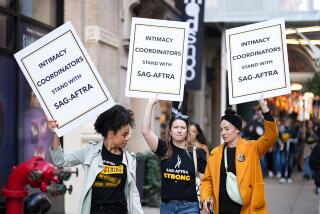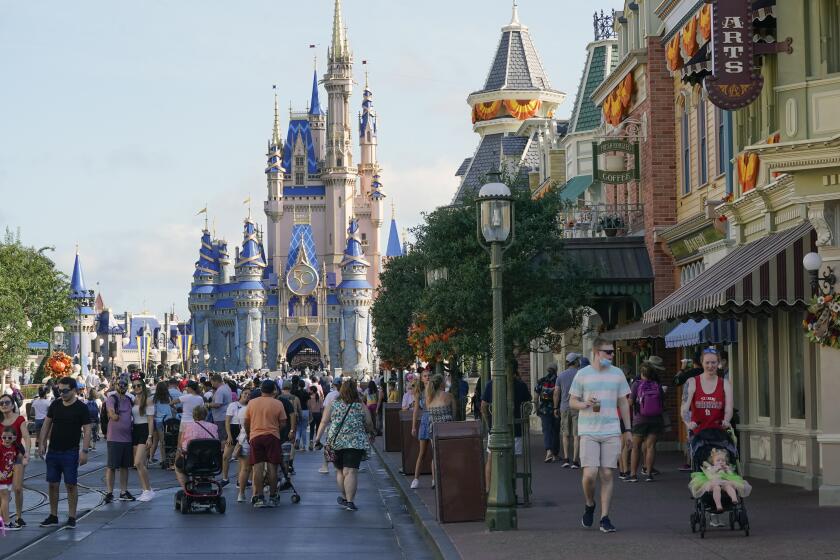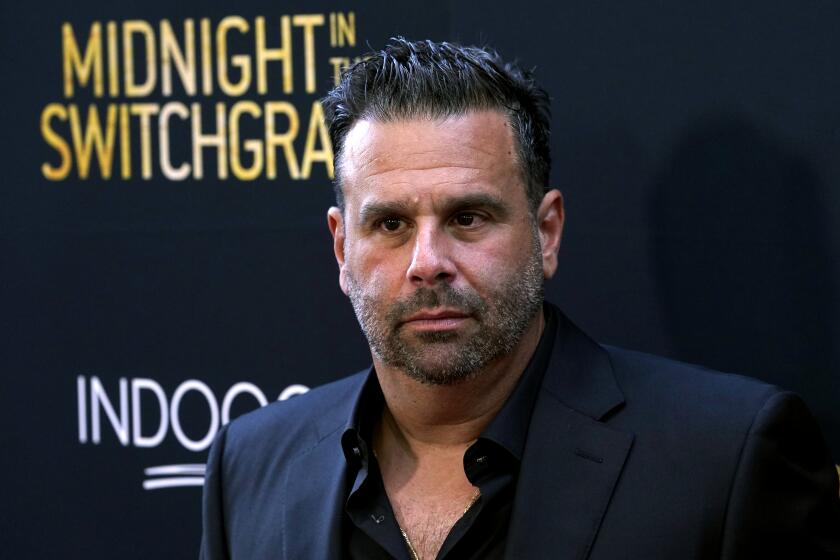What is a COVID-19 compliance supervisor? What to know about Hollywood’s newest job
- Share via
The pandemic has spawned a new job on Hollywood sets — the COVID-19 compliance supervisor.
The role was created under an agreement last month between entertainment unions and an alliance of producers as part of the terms for Hollywood’s return to production. Already, an industry is emerging around this important position. Some companies are offering training and certification, others are providing consulting services to productions.
The film and television community in the U.S. has slowly been returning to work since June after an almost complete shutdown in March because of the pandemic. Hundreds of thousands of jobs were lost as a result.
Producers and crew members used to working on crowded and messy sets are now having to adapt to new arrangements and are looking to compliance supervisors to keep them safe and to keep productions going.
John Nolan, an assistant director who died last week after a battle with COVID-19, worked on a commercial shoot in Texas.
“The challenge is that we’re living in a new world; the way that people have gone about doing their jobs on the set has changed dramatically” said Thom Davis, business manager of IATSE Local 80, which represents set medics, grips and other workers. Productions are required to have set medics; some of them have also taken on the position of compliance supervisor.
“You’ve learned to do things in a certain way,” Davis added. “And now, all of a sudden, you can’t do that. It takes a mental retraining.”
What is a COVID-19 compliance supervisor?
According to the agreement, producers must hire a supervisor who is responsible for compliance and enforcement of industry protocols on each production.
The demands of the job are big: sanitization, testing, safety equipment and distancing. Cast and crew are split into different zones, based on the frequency of testing and ability to wear masks. The compliance supervisor is responsible for making sure these groups don’t mix and has to intervene if crew members crowd together and masks slip.
The compliance supervisor is also responsible for training other crew members, such as first assistant directors, so they can pass on safety directions to their units. They have to be available at all times during working hours, according to the agreement.
Critically, this person has the power to stop a production if there are concerns about safety and has the ability to discipline — or even fire — safety protocol violators. Given that shutdowns on large productions can cost hundreds of thousands of dollars a day, that is a big responsibility.
How do you become a COVID compliance supervisor?
There is no one route to the position. Unions and producers didn’t set out required qualifications or training. As a result, compliance supervisors have a variety of backgrounds in medicine, film production or set safety.
For L.A.-based Jessica Lesley, it was an opportunity to start a new business. Lesley, 35, has a bachelor of science degree from Alabama’s Tuskegee University and went on to the L.A.-based Streetlights production assistants course, which helps young people from diverse communities access Hollywood.
This summer, she thought her science background made her a good fit for providing COVID-19 safety services to the industry. “I started my company, and I’ve been going since June, and I’ve been extremely busy,” Lesley said, adding that she’s been booking jobs and hiring others to work with her on commercial shoots around the country.
She charges about $500 a day for a COVID compliance supervisor, less for assistants. Some charge as much as $1,000 a day.
Other companies have started up to offer compliance services and training to productions. Some focus on training for compliance supervisors.
One such company is the San Carlos, Calif.-based Health Education Services. It offers a two-hour webinar for $50; participants who pass the course receive a certificate and their names are listed on the the company’s database. About 300 people a week are attending, said DJay Brawner, who helps teach the online sessions.
This course is targeted at those who have on-set experience, such as assistant directors or production assistants, but who may not have a background in science. Once the course is completed, participants get access to resources they can use in the job, such as screening surveys.
L.A. resident Will Nitch took the course and is on a public database of trained officers. Nitch, 40, has held various jobs in the entertainment industry, including as a production coordinator. About a month ago, he started a new business with actor Eddie Hargitay, focused on compliance services. They bought up trailers, hand-washing stations and cleaning products to provide all the services needed to make a production compliant, he said.
“My livelihood operates on whether Hollywood is operating or not,” Nitch said. “I take it very seriously. I don’t want Hollywood to shut down again.”
Pure Sets, an LA-based company founded in the pandemic, provides a one-stop shop for productions. It has a roster of supervisors who have worked as medics, first responders, even a Navy seal. “One of the big challenges is finding people with a leadership quality,” said founder Julian Lemaitre.
As part of the industry agreement, every production employee must complete a COVID-19 safety course. One such provider is a Burbank-based nonprofit, Contract Services. However, the training isn’t intended to cover all that a compliance supervisor might need.
For some, that job is seen as a possible way into the industry when work is in short supply. But industry experience is often expected.
“All the producers I’ve talked to, especially the studios, indicate that what they are looking for, is somebody who has extensive on-set experience and preferably has a medical background, but that’s not an absolute requirement,” said Crabtree-Ireland.
No set standard of training has raised concerns.
Although unions and filmmakers agree that this role is necessary to keep the industry going and casts and crews safe, the new protocols do not lay out specific training requirements.
Consequently, experience and knowledge can vary widely.
One worry is that producers may not take the role seriously enough, for example by hiring production assistants to double as compliance supervisors. Some crew have been concerned when the compliance supervisor on set has not stepped in to limit crowding or enforce sanitation standards or mask wearing. “A lot of people are jumping on it as a quick way to make a buck and don’t take the responsibility seriously,” Lesley said.
Union officials even changed the name of the position, which originally was known as compliance officer, to reflect the authority needed on set, said Duncan Crabtree-Ireland, SAG-AFTRA’s chief operating officer and general counsel.
“I’ve heard sporadic concerns about the training, but I’ve also heard concerns more about how that role fits in with the existing structure of the management representatives that the people are used to dealing with,” said Crabtree-Ireland, who is leading the union’s safety and reopening initiative.
Pasadena-based Neil Larson has been doing production safety work as a third-party contractor for several years and is now a compliance supervisor on sets. Larson, 61, said he took contact tracing and epidemiology courses online from Johns Hopkins University, along with other safety training. Since spring, he has been a compliance supervisor on shows like MTV’s “Ridiculousness” and Nickelodeon’s “Top Elf.”
The level of experience and effectiveness of the supervisor varies between productions. “People will come back to me from other shows saying, ‘Oh, God, it was horrible. I didn’t feel safe,’” Larson said. Some producers want the compliance supervisor to just “show up and shut up” and simply tick a box by being on set, Larson said. “You can’t do that. You have to keep people safe.”
More to Read
Inside the business of entertainment
The Wide Shot brings you news, analysis and insights on everything from streaming wars to production — and what it all means for the future.
You may occasionally receive promotional content from the Los Angeles Times.











